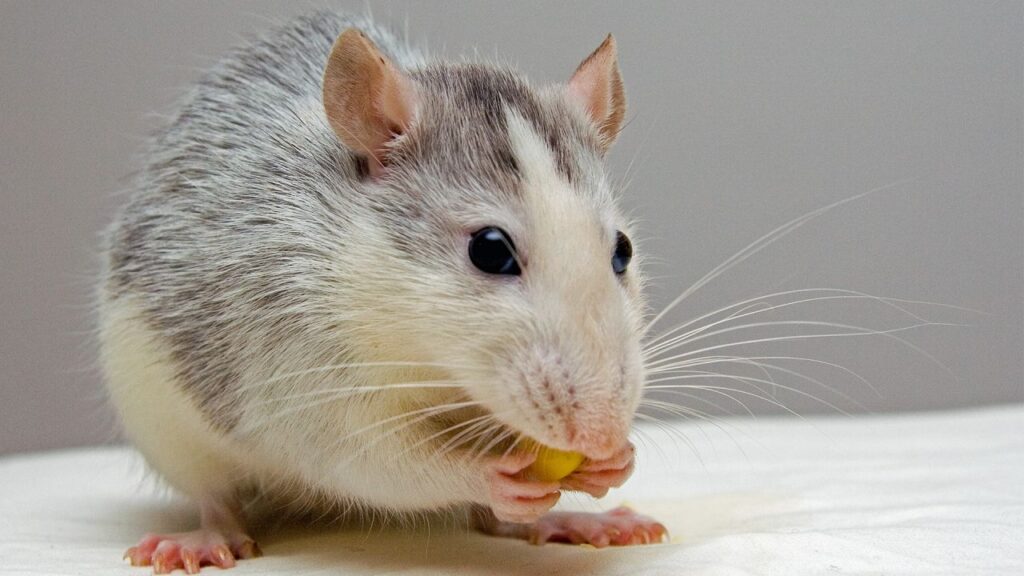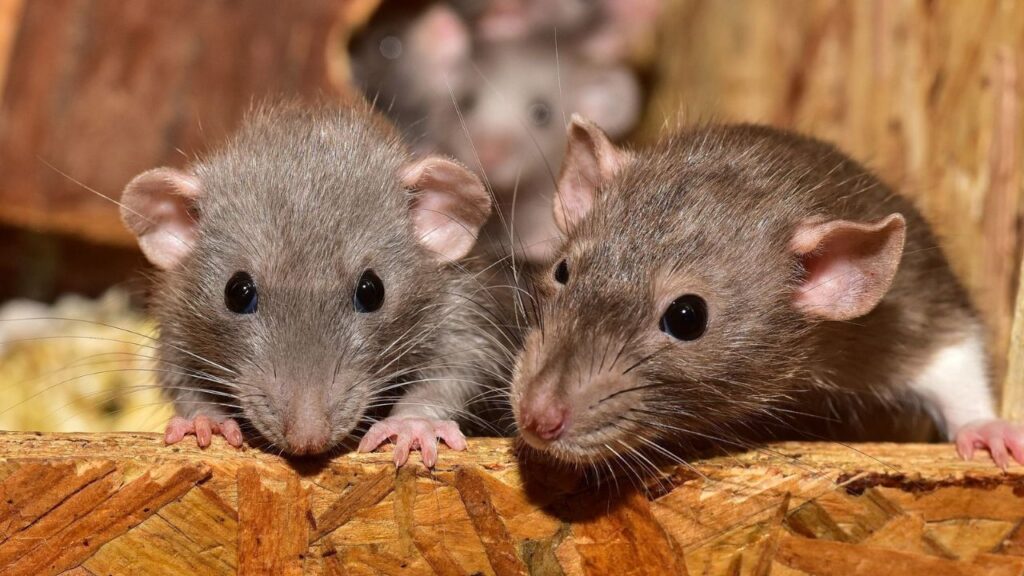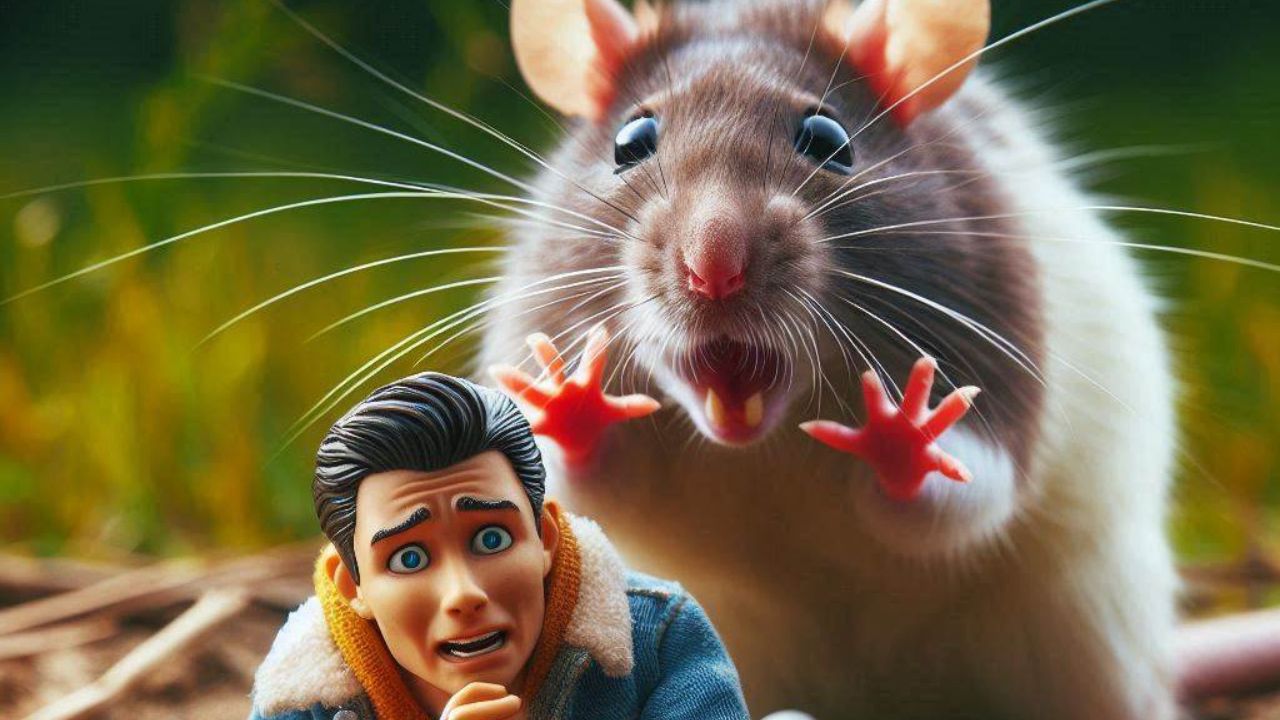Can Rats Attack Humans? Rats can attack humans, especially when they feel threatened or cornered, but such incidents are rare. They are more likely to bite if provoked or seeking food.
Rats are notorious for being one of the most adaptable and widespread species of rodents. They are found in almost every corner of the globe, thriving in urban and rural environments alike.
While many people view rats as pests that carry diseases and invade their homes, there is an often-overlooked concern: Can rats attack humans?
The short answer is yes, but these attacks are rare and often occur due to specific circumstances such as fear, hunger, or a threat to their survival.
In this article, we’ll dive deep into understanding why rats might attack humans, the potential health risks, and how to prevent such encounters.
Contents
What Are Rats?
Rats belong to the family Muridae, and they have become one of the most recognizable species of rodents due to their close proximity to human populations. Two of the most common species of rats that humans encounter are:
- Norway Rats (Brown Rats): Larger and stockier, these rats are often found in urban settings such as subways, sewers, and even inside buildings. They are excellent burrowers and can gnaw through wood, plastic, and even some metals to access food and shelter.
- Roof Rats (Black Rats): More slender and agile, roof rats are skilled climbers and are often found nesting in high places such as attics, roofs, and trees. They are also common in coastal areas and warmer climates.
Both species of rats can pose a threat to human health due to the diseases they carry, but what about their capacity for aggression?

Can Rats Attack Humans?
Rats are generally not aggressive toward humans and tend to avoid confrontation. However, under certain conditions, rats can and do attack humans.
Most often, these attacks occur when rats feel threatened, cornered, or are in dire need of food. Let’s explore the different triggers for rat aggression.
1. Aggression Triggers in Rats
Rats are naturally cautious animals that avoid large predators, including humans. However, if a rat feels trapped or threatened, it may lash out in self-defense. [Can Rats Attack Humans?]
For example, if a rat gets stuck inside a house and is cornered by a person or pet, it may bite to protect itself. Rats are also known to become more aggressive when their nest or young are at risk.
This defensive behavior is common in most animals, but it’s important to remember that rats will only resort to aggression when they perceive no other option. In general, rats prefer to flee rather than fight.
2. Rat Bites and Attacks
Rat bites on humans are rare but can be serious when they occur. These bites usually happen when a person tries to handle or trap a rat, leading to a defensive reaction.
Another scenario where bites occur is during sleep. In extreme cases, when rats are desperate for food, they may mistake a person’s fingers or toes for a food source and bite.
It’s worth noting that even though rat bites are uncommon, they can lead to severe infections and complications if not treated properly. If bitten by a rat, it’s crucial to seek medical attention immediately to prevent the risk of infections.
3. Reasons for Rat Attacks
There are several reasons why a rat might attack a human:
- Fear and Self-Defense: Rats, like most animals, will attack if they feel their life is in danger. This often happens when they are cornered or trapped.
- Hunger: In rare cases, particularly in urban environments where food is scarce, rats may act more aggressively in their search for food. Hungry rats have been known to bite humans in their sleep if they mistake their skin for food.
- Protection of Young or Nest: Rats are protective of their young, and if they perceive a threat to their nest, they may bite to defend their offspring.
4. Environmental Factors
Urban environments where food sources are scarce and rats are competing for space can lead to more aggressive rat behavior.
Overcrowding and limited resources force rats to take risks they would normally avoid, such as approaching humans or entering homes in search of food.
In rural areas, where rats have more natural food sources and space, they are generally less aggressive toward humans. [Can Rats Attack Humans?]
Moreover, natural disasters or urban decay, which reduce rats’ access to food and shelter, can increase the likelihood of aggressive rat behavior.
When rats are desperate, they may be bolder in their attempts to secure food, which can sometimes lead to attacks.

Health Risks from Rat Attacks
Rat bites are not just painful; they can be dangerous because rats are carriers of numerous diseases.
The saliva of a rat can contain harmful pathogens, and even their urine and feces pose a health risk. [Can Rats Attack Humans?]
Here are some of the primary diseases that can be transmitted through rat bites or contact:
- Rat-Bite Fever: This bacterial infection can cause fever, muscle pain, vomiting, and rashes. If untreated, it can lead to serious complications such as infections of the heart.
- Leptospirosis: Spread through contact with rat urine, leptospirosis can cause liver and kidney damage and, in severe cases, can be fatal.
- Hantavirus: Though rare, hantavirus can be transmitted through exposure to rat droppings, urine, or saliva. It causes respiratory illness that can be fatal if not treated.
- Salmonellosis: Rats can carry salmonella bacteria, which can cause severe food poisoning in humans. [Can Rats Attack Humans?]
- Tularemia: This is another bacterial infection that can be contracted through contact with an infected rat or its bites. It can lead to symptoms like fever, swollen lymph nodes, and skin ulcers.
If you are bitten by a rat, it is important to wash the wound immediately with soap and water, apply an antiseptic, and seek medical attention to ensure that no infections develop.
Preventing Rat Attacks
While the risk of being attacked by a rat is low, it’s still important to take preventive measures, especially in areas where rats are common. Here are some effective ways to prevent rat attacks:
1. Rat Control and Extermination
The best way to prevent rat attacks is to avoid encounters with rats altogether. Here are some tips to control and prevent rat infestations in your home or property:
- Seal Entry Points: Inspect your home for cracks, gaps, or holes that rats could use to enter. Seal these entry points with steel wool, caulk, or other materials rats cannot chew through.
- Keep Food Stored Properly: Rats are attracted to easily accessible food. Store food in airtight containers, clean up crumbs and spills promptly, and avoid leaving pet food out overnight.
- Reduce Clutter: Rats love to hide in clutter, especially in basements, attics, and garages. Keep these areas organized and free of potential hiding spots. [Can Rats Attack Humans?]
- Professional Pest Control: If you have a rat infestation, it may be necessary to call professional exterminators who can handle the situation safely and effectively.
2. Personal Safety Tips
In the unlikely event that you encounter a rat, it’s important to know how to protect yourself:
- Avoid Contact: Never try to handle or approach a wild rat. Rats are fast and can bite if they feel threatened.
- Give Rats Space: If you encounter a rat in your home or yard, give it space to escape. Rats will usually flee if they have a clear exit.
- Use Caution at Night: Rats are nocturnal, so take extra care when walking through areas where rats are known to be active, particularly at night. Secure trash bins and clean up food waste to avoid attracting rats.
Rats and Human Psychology
Rats have long been subjects of fear and fascination in human culture.
Some people are terrified of them, while others view them as symbols of survival and resourcefulness.
The following sections delve into the psychological aspects of human-rat interaction. [Can Rats Attack Humans?]
1. Fear of Rats (Musophobia)
Musophobia, or the fear of rats, is one of the most common phobias worldwide. This fear is often rooted in the association of rats with disease, filth, and decay.
Many people are repelled by rats’ appearance, particularly their sharp teeth and twitching whiskers. The fear of rats can be so intense that it causes anxiety, panic attacks, and even nightmares.
People who live in rat-infested areas often experience heightened anxiety and stress.
The knowledge that rats are nearby, especially if they are entering homes or contaminating food, can take a psychological toll on individuals, leading to sleep disturbances and a constant state of vigilance.
2. Cultural Perceptions of Rats
Rats have been both revered and reviled throughout history. In some cultures, rats are seen as symbols of resourcefulness, intelligence, and survival.
For example, in Chinese culture, the rat is the first animal in the zodiac, representing cleverness and prosperity. [Can Rats Attack Humans?]
On the other hand, many Western cultures view rats as dirty, disease-ridden creatures to be feared and exterminated.
This negative perception is often reinforced by media portrayals of rats in horror films, cartoons, and literature, where they are depicted as harbingers of disease, filth, and even death.
Final Verdict
Although rats can attack humans, such incidents are rare and usually occur under specific circumstances, such as when the rat feels threatened, cornered, or is extremely hungry.
Rat bites can pose serious health risks due to the diseases they carry, so it’s essential to take preventive measures to avoid encounters with rats.
Keeping your home clean, sealing entry points, and avoiding direct contact with wild rats can significantly reduce the likelihood of an attack.
Ultimately, understanding rat behavior and minimizing their presence in human environments is key to ensuring safety. [Can Rats Attack Humans?]
See Also: Do Skunks Attack Humans? The Skunk Dilemma!
FAQs
Are rats dangerous to humans?
Yes, rats can be dangerous due to the diseases they carry and their ability to bite when provoked, though such incidents are rare.
What diseases can humans catch from rats?
Rats can transmit diseases like rat-bite fever, leptospirosis, hantavirus, and salmonellosis through bites, urine, and feces.
How do you know if a rat is about to attack?
Signs of aggression in rats include raised fur, hissing, or biting attempts if approached too closely. [Can Rats Attack Humans?]
Can a rat attack kill a human?
While rat attacks are unlikely to kill a human directly, the infections from bites can be serious if left untreated.
What should you do if a rat bites you?
Clean the wound with soap and water, apply an antiseptic, and seek medical attention to prevent infection.
Conclusion: Can Rats Attack Humans?
While rats are typically shy and avoid humans, they can become aggressive if cornered or threatened. [Can Rats Attack Humans?]
Understanding their behavior, minimizing risks in your environment, and knowing how to handle encounters with rats can significantly reduce the likelihood of a dangerous interaction.
If you live in an area with a high rat population, taking proactive measures to control their access to your home and maintaining a clean living space are essential.
Always be cautious when dealing with wild rats and seek professional help if you suspect an infestation. By doing so, you can protect yourself and your family from potential harm caused by rats.

Hello, I am Rosa Ellis, a mother of two and a wildlife blogger. I grew up in New York City, but I love exploring forests. I’ve traveled to places like Yellowstone National Park and the Amazon Rainforest to see animals up close. I know a lot about animal behavior and which animals can be dangerous to humans. Thanks for visiting my blog!

